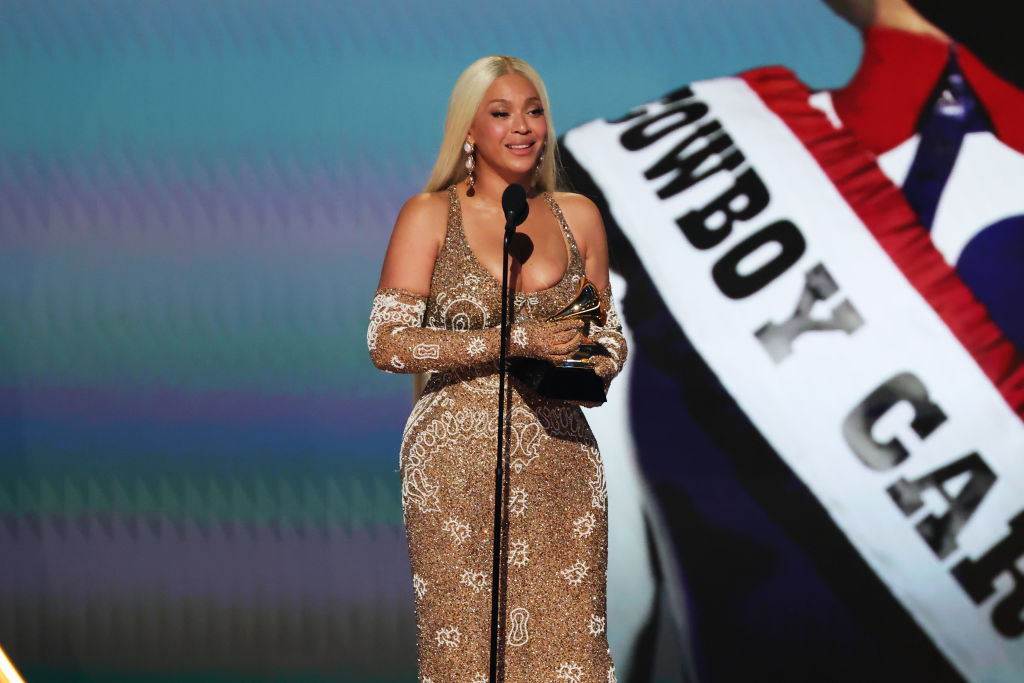The Recording Academy has announced a significant change coming to the 2026 Grammy Awards. The long-standing Best Country Album category is being retired. In its place, two new categories will debut: Best Contemporary Country Album and Best Traditional Country Album. While the Academy cites a desire to better represent the genre’s breadth, many are speculating that Beyoncé’s historic win earlier this year was the true catalyst for this decision.
Why Beyoncé’s Triumph May Have Shifted the Grammys
When Beyoncé dropped “Cowboy Carter,” she was reclaiming space in a genre deeply rooted in Black history. Her win for Best Country Album in 2025 marked a cultural turning point, making her the first Black artist to ever claim the award. The moment was monumental, not just for Beyoncé, but for country music as a whole. It reignited national conversations about the genre’s origins and opened the door to broader representation.
The Recording Academy explained that the category update was a response to the growing diversity within country music and the desire to give more room for recognition. However, the timing was impossible to ignore. Beyoncé’s impact was undeniable. Her presence in the category disrupted longstanding genre norms and pushed the boundaries of what mainstream country has historically accepted.
Did Race Play a Factor?
In online spaces and fan circles, the consensus is mixed. Some believe the new categories allow for greater representation, offering space to a broader range of country artists, especially those from marginalized backgrounds. Others feel the timing of the change suggests discomfort with Beyoncé’s win, an attempt to preserve traditional country as a separate, perhaps whiter, space within the genre.
Following her 2025 win, public reactions revealed a clear racial divide. Many Black listeners and genre-expanding fans celebrated Beyoncé’s recognition as overdue, citing her deliberate homage to country traditions and the genre’s Black origins. But among some white country artists and fans, the response was notably cooler. A few high-profile country stars avoided commenting altogether, while others offered only lukewarm praise, focusing more on the album’s “crossover appeal” than its merit within the genre. In country music forums and comment sections, complaints ranged from accusations that Beyoncé’s album wasn’t “real” country to claims that the Grammys were caving to political correctness.
This subtle resistance mirrors the backlash that has historically greeted Black artists entering country spaces, from Charley Pride in the 1970s to Mickey Guyton and Lil Nas X more recently. In Beyoncé’s case, even before her Grammy win, the release of “Cowboy Carter” sparked heated debates over whether she “belonged” in country, a genre that has long been gatekept through unspoken norms around race, sound, and authenticity.
Traditional vs. Contemporary Country
Understanding the difference between “traditional” and “contemporary” country music helps clarify why the Academy may have felt the need to split the category. Traditional country leans into acoustic instrumentation like the banjo, fiddle, and steel guitar. It stays close to the storytelling roots of rural life, love, and heartache, and often includes older sub-genres like Western-swing and Outlaw country. On the other hand, contemporary country embraces modern production and often incorporates elements of pop, rock, or R&B. It reflects the genre’s evolving identity, similar to how the Grammys have differentiated styles in R&B and blues categories.
There’s no denying that Beyoncé’s influence helped spotlight the genre’s complexity and forced institutions to reckon with its legacy. Her album blurred the lines between contemporary innovation and traditional homage, making it difficult to neatly categorize. The new Grammy structure may be a way for the Academy to better organize the genre’s diversity. However, it also invites questions about who gets included under “traditional” and who defines that standard.
Relevance and Genre Bending
Beyoncé’s impact on country isn’t an isolated incident, it’s part of a bigger pattern unfolding across music. As more artists push genre boundaries, music awards are finding it harder to fit them into neat boxes. At the 2025 BET Awards, for example, Memphis rapper GloRilla took home the Best Gospel/Inspirational Artist award for “Rain Down on Me,” a collaboration with Kirk Franklin and Maverick City Music. Although the song has a gospel theme, many argued GloRilla isn’t a gospel artist. Some, like singer Deitrick Haddon, argue her win steps on the toes of those creating gospel music regularly.
This incident highlights how award shows struggle to define a genre when artists are constantly crossing into new sonic territory. Just last year, the Grammys introduced Best Alternative Jazz Album, a nod to albums that blend jazz with R&B, hip-hop, electronic, and other influences.
Regardless of the Academy’s true intent, it’s clear that Beyoncé’s “Cowboy Carter” was more than an album that brought a cultural shift. Her entry into country challenged expectations as well as changed the landscape. With the 2026 Grammy Awards approaching, these new categories could offer opportunities for artists of color to thrive in both traditional and contemporary country spaces. Or, they could risk reinforcing old boundaries under a new name.
